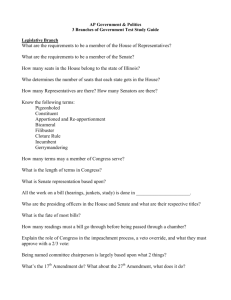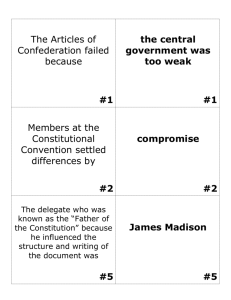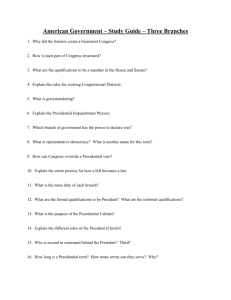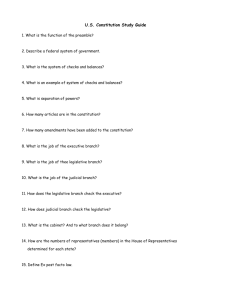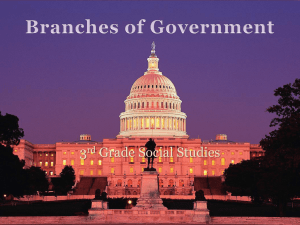Checks and Balances Worksheet
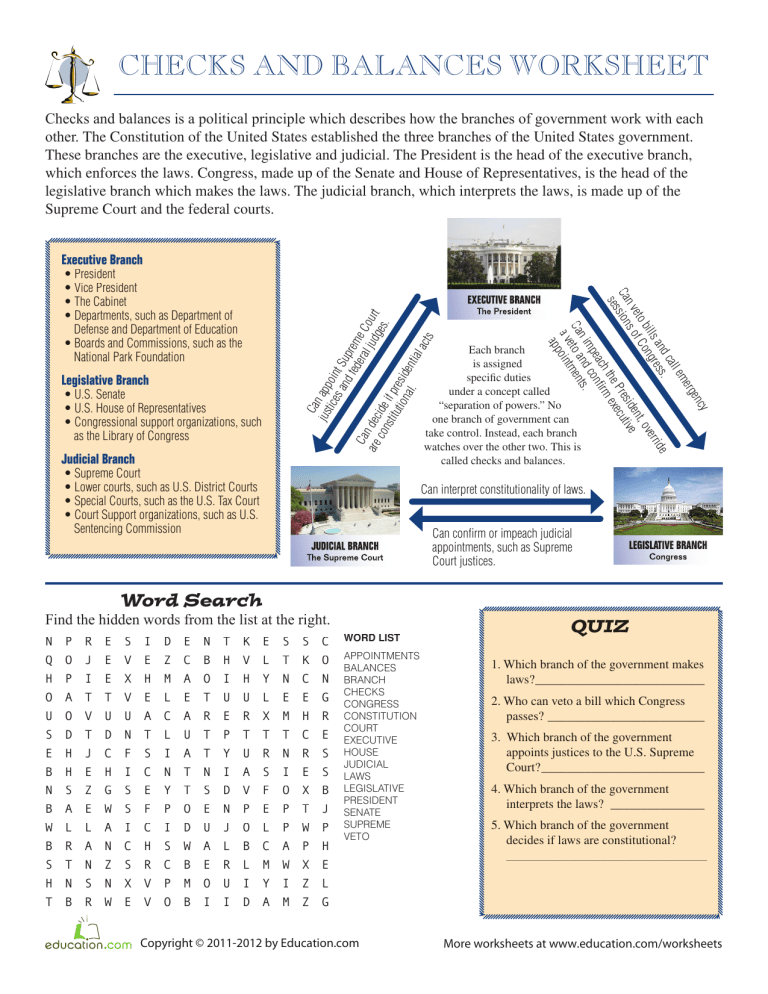
CHECKS AND BALANCES WORKSHEET
Checks and balances is a political principle which describes how the branches of government work with each other. The Constitution of the United States established the three branches of the United States government.
These branches are the executive, legislative and judicial. The President is the head of the executive branch, which enforces the laws. Congress, made up of the Senate and House of Representatives, is the head of the legislative branch which makes the laws. The judicial branch, which interprets the laws, is made up of the
Supreme Court and the federal courts.
Executive Branch
• President
• Vice President
• The Cabinet
• Departments, such as Department of
Defense and Department of Education
• Boards and Commissions, such as the
National Park Foundation
Legislative Branch
• U.S. Senate
• U.S. House of Representatives
• Congressional support organizations, such as the Library of Congress
Judicial Branch
• Supreme Court
• Lower courts, such as U.S. District Courts
• Special Courts, such as the U.S. Tax Court
• Court Support organizations, such as U.S.
Sentencing Commission
JUDICIAL BRANCH
The Supreme Court
Word Search
Find the hidden words from the list at the right.
N P R E S I D E N T K E S S C
Q O J E V E Z C B H V L T K O
H P I E X H M A O I H Y N C N
O A T T V E L E T U U L E E G
U O V U U A C A R E R X M H R
S D T D N T L U T P T T T C E
E H J C F S I A T Y U R N R S
B H E H I C N T N I A S I E S
N S Z G S E Y T S D V F O X B
B A E W S F P O E N P E P T J
W L L A I C I D U J O L P W P
B R A N C H S W A L B C A P H
S T N Z S R C B E R L M W X E
H N S N X V P M O U I Y I Z L
T B R W E V O B I I D A M Z G
WORD LIST
APPOINTMENTS
BALANCES
BRANCH
CHECKS
CONGRESS
CONSTITUTION
COURT
EXECUTIVE
HOUSE
JUDICIAL
LAWS
LEGISLATIVE
PRESIDENT
SENATE
SUPREME
VETO
EXECUTIVE BRANCH
The President
Each branch is assigned specifi c duties under a concept called
“separation of powers.” No one branch of government can take control. Instead, each branch watches over the other two. This is called checks and balances.
rm executive
Can interpret constitutionality of laws.
Can confi rm or impeach judicial appointments, such as Supreme
Court justices.
QUIZ
LEGISLATIVE BRANCH
Congress
1. Which branch of the government makes laws? ___________________________
2. Who can veto a bill which Congress passes? _________________________
3. Which branch of the government appoints justices to the U.S. Supreme
Court? __________________________
4. Which branch of the government interprets the laws? _______________
5. Which branch of the government decides if laws are constitutional?
________________________________
�������������������������������������� �����������������������������������������������
CHECKS AND BALANCES WORKSHEET
Checks and balances is a political principle which describes how the branches of government work with each other. The Constitution of the United States established the three branches of the United States government.
These branches are the executive, legislative and judicial. The President is the head of the executive branch, which enforces the laws. Congress, made up of the Senate and House of Representatives, is the head of the legislative branch which makes the laws. The judicial branch, which interprets the laws, is made up of the
Supreme Court and the federal courts.
Executive Branch
• President
• Vice President
• The Cabinet
• Departments, such as Department of
Defense and Department of Education
• Boards and Commissions, such as the
National Park Foundation
Legislative Branch
• U.S. Senate
• U.S. House of Representatives
• Congressional support organizations, such as the Library of Congress
Judicial Branch
• Supreme Court
• Lower courts, such as U.S. District Courts
• Special Courts, such as the U.S. Tax Court
• Court Support organizations, such as U.S.
Sentencing Commission
EXECUTIVE BRANCH
The President
Each branch is assigned specifi c duties under a concept called
“separation of powers.” No one branch of government can take control. Instead, each branch watches over the other two. This is called checks and balances.
rm executive
Can interpret constitutionality of laws.
JUDICIAL BRANCH
The Supreme Court
Word Search
Find the hidden words from the list at the right.
N P R E S I D E N T K E S S C
Q O J E V E Z C B H V L T K O
H P I E X H M A O I H Y N C N
O A T T V E L E T U U L E E G
U O V U U A C A R E R X M H R
S D T D N T L U T P T T T C E
E H J C F S I A T Y U R N R S
B H E H I C N T N I A S I E S
N S Z G S E Y T S D V F O X B
B A E W S F P O E N P E P T J
W L L A I C I D U J O L P W P
B R A N C H S W A L B C A P H
S T N Z S R C B E R L M W X E
H N S N X V P M O U I Y I Z L
T B R W E V O B I I D A M Z G
WORD LIST
APPOINTMENTS
BALANCES
BRANCH
CHECKS
CONGRESS
CONSTITUTION
COURT
EXECUTIVE
HOUSE
JUDICIAL
LAWS
LEGISLATIVE
PRESIDENT
SENATE
SUPREME
VETO
Can confi rm or impeach judicial appointments, such as Supreme
Court justices.
QUIZ
LEGISLATIVE BRANCH
Congress
1. Which branch of the government makes laws? Legislative
2. Who can veto a bill which Congress passes? The President/Executive
3. Which branch of the government appoints justices to the U.S. Supreme
Court? Executive
4. Which branch of the government interprets the laws? Judicial
5. Which branch of the government decides if laws are constitutional?
Judicial
�������������������������������������� �����������������������������������������������

